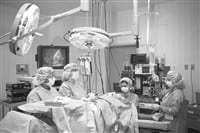Cutting-edge Approach To Cardiac Surgery New Advances Include Endoscopic Vein Harvesting And Beating Heart Surgery
Baystate Medical Center is the only hospital providing cardiovascular and aortic surgical services in Western Mass. The surgeons, including Drs. John A. Rousou, Joseph E. Flack III, David W. Deaton, and Daniel T. Engelman, perform more than 800 open-heart surgical procedures each year at Baystate. Coronary artery bypass procedures are performed with a special emphasis on arterial grafts. Both valve repair and replacement procedures, as well as aortic, ventricular, and adult congenital procedures, are performed.
Coronary artery bypass grafting is one of the most common surgical procedures performed worldwide, with over 500,000 performed annually in North America. Nonetheless, far from becoming a routine procedure, there are many exciting new developments in the surgical treatment of cardiovascular disease. What follows is a brief description of some of these advances.
Endoscopic Vein Harvesting
Patients recovering from coronary artery bypass surgery often complain that the most painful part of their recovery is that associated with the leg incisions.
Conventionally, two-foot long skin incisions have been used to surgically remove the veins that will bypass blood around the blocked coronary arteries. Healing these wounds can result in significant post-operative discomfort and limit ambulation and rehabilitation. In addition, diabetic patients are at increased risk for infection in these wounds.
Cardiac surgeons at Baystate have begun employing state-of-the-art techniques to remove the leg veins using only three small one-inch incisions. This reduces the risk for infection, swelling, scarring, and discomfort associated with the vein harvesting. Using “endoscopic vein harvesting,” doctors place a small camera into the leg and dissect the tissue surrounding the vein using specially designed instruments.
Beating Heart Surgery
Coronary bypass surgery is normally performed by stopping the heart and supporting the circulation using a heart-lung machine. This machine induces an inflammatory response, which affects both the blood cells and other organ systems. This can necessitate the use of blood transfusions, as well as prolong the hospitalization. The cardiac surgeons at Baystate have mastered the newest techniques in “off-pump” revascularization. In selected patients, using specially designed heart stabilizers, it is possible to bypass blocked coronary arteries on a beating heart. This eliminates the need for the heart-lung machine and has the potential to reduce the pain, trauma, and postoperative complications that can be associated with heart surgery.
Surgical Glue
One to two weeks following a heart attack, a small percentage of patients can develop a small tear in the injured heart wall. Historically, this ventricular rupture has been almost universally fatal. A recently approved drug called “Bio-Glue” has revolutionized the treatment of this disease. This is a sealant composed of proteins that seals leaks around stitches placed to control the leaking heart chamber. Recent use of this material has resulted in full recovery in multiple patients who would have otherwise succumbed from this disease.
Reduce Blood Transfusions
It is estimated that about 20{06cf2b9696b159f874511d23dbc893eb1ac83014175ed30550cfff22781411e5} of all blood transfused in North America is associated with cardiac surgery. We believe efforts should continue to be made to reduce the need for blood transfusions during surgery, and we have developed techniques that reduce the blood dilution during cardiopulmonary bypass and raise post-operative blood counts. One of the most novel approaches involves the use of a new soluble hemoglobin-oxygen-carrying solution called Hemolink™.
Through a multicenter trial involving 40 leading medical centers, doctors at Baystate will be selecting patients to be given the option of receiving this drug and potentially reducing utilization of banked blood.
Surgery for Atrial Fibrillation
There is a significant population of patients, many with heart valve disease, that suffer from an irregular heart rhythm called atrial fibrillation. Most of these patients require permanent anticoagulation with coumadin, which can cause bleeding complications and requires frequent monitoring. In addition, these patients can form blood clots in their hearts that can result in strokes. Many patients in chronic atrial fibrillation do not feel energetic because it reduces overall heart function. Doctors at Baystate are currently exploring a new procedure known as the “Cryo-maze procedure” that has been found to permanently convert atrial fibrillation to a normal rhythm in 80{06cf2b9696b159f874511d23dbc893eb1ac83014175ed30550cfff22781411e5} of cases. This eliminates the need for anticoagulation and reduces the risk of blood clot formation.
Robotic Surgery
Cardiac surgeons worldwide have been experimenting with robots and cardiac surgery. In the future, the cardiac surgeons at Baystate Medical Center hope to be able to perform the Off-pump, Totally Endoscopic Coronary Artery Bypass (OPTECAB) procedure. Using recently invented robotic instruments, it may be possible to bypass selected coronary arteries without stopping the heart or opening the chest. One-inch incisions are placed in the chest, through which four robotically controlled, miniature arms are manipulated by a surgeon at a computer console.
Positive Outcomes
Outcomes at Baystate match or exceed that of many of the best known open-heart surgery programs in America, according to the Society of Thoracic Surgeons database. In addition to striving for technical excellence, Baystate also emphasizes a patient-centered, locally oriented approach to care that allows substantial family involvement and support to patients close to their homes.
For more information about the cardiac surgery program at Baystate Medical Center, call Cardiac Surgery Associates of Western Massachusetts at (413) 794-5550 or The Professionals at (413) 794-2255 or 1-800-377-HEALTH.



Comments are closed.